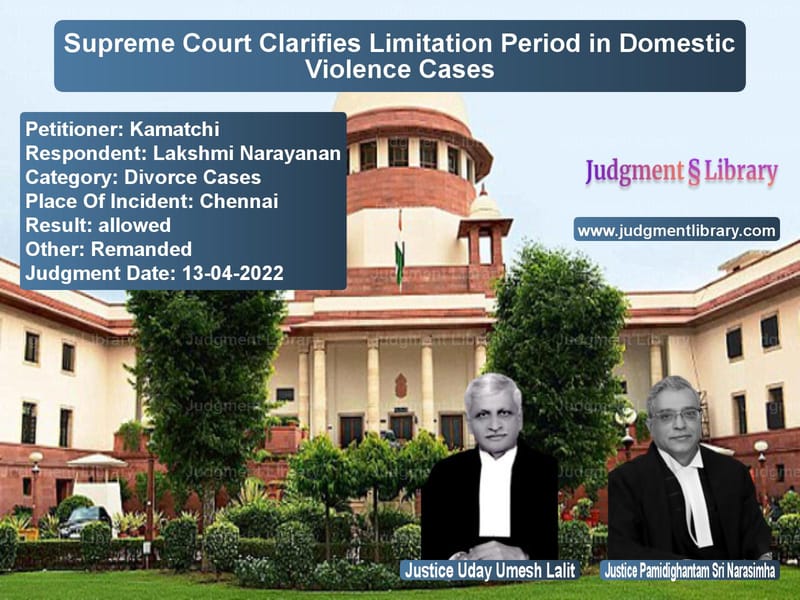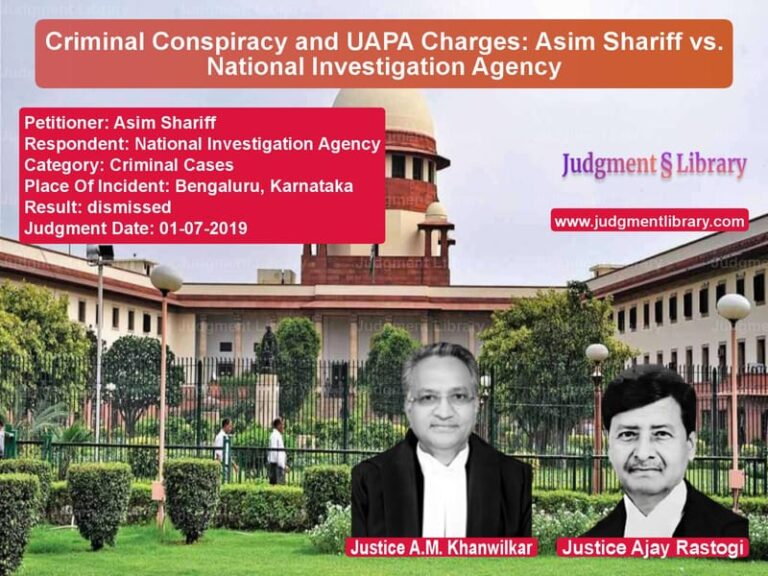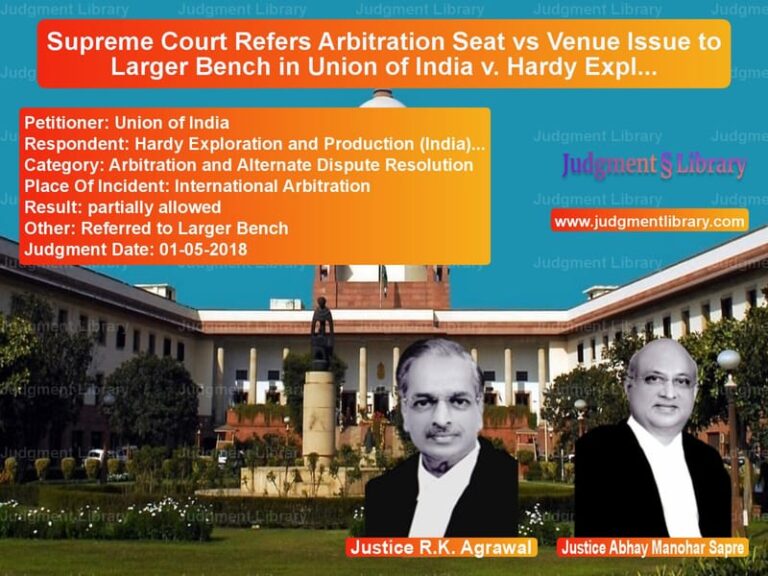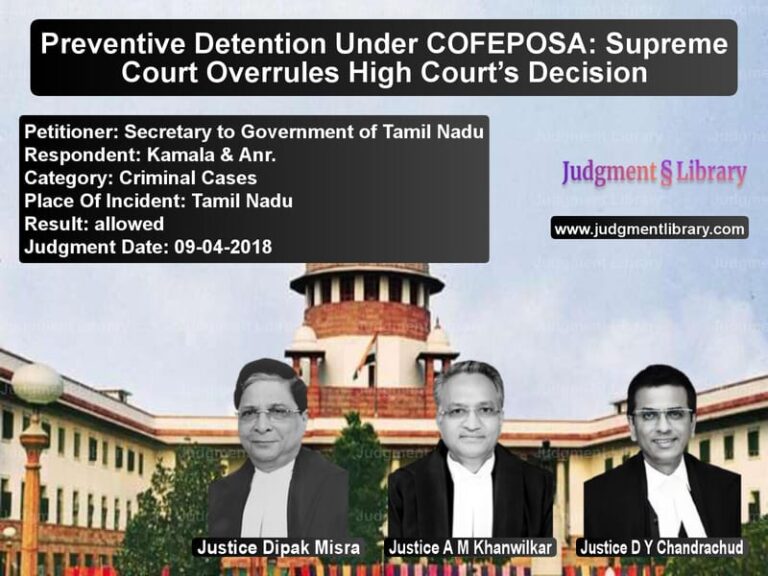Supreme Court Clarifies Limitation Period in Domestic Violence Cases
The Supreme Court of India recently ruled on a crucial issue concerning the limitation period for filing cases under the Protection of Women from Domestic Violence Act, 2005. The judgment, delivered in the case of Kamatchi vs. Lakshmi Narayanan, sheds light on whether a complaint under the Act can be dismissed solely on the grounds of delay. This ruling is particularly significant as it impacts the rights of women seeking protection from domestic abuse, even after prolonged periods of separation.
Background of the Case
The appellant, Kamatchi, filed an application under Section 12 of the Domestic Violence Act before the Judicial Magistrate, Ambattur, Chennai, seeking protection orders under Sections 17 and 18 of the Act. Her complaint detailed multiple instances of domestic abuse by her husband, father-in-law, and sister-in-law, spanning several years.
According to her allegations:
- Her in-laws demanded additional dowry, insulting her father for not providing enough jewelry.
- She faced repeated humiliation regarding her economic status.
- Her husband physically and emotionally abused her, particularly regarding her right to travel to London with him.
- During her pregnancy, she was pressured to undergo an abortion.
- After giving birth, her in-laws refused to accept the child as part of the family.
- Despite a High Court order for restitution of conjugal rights, she was forcibly prevented from entering her husband’s house.
Based on these allegations, she sought legal recourse under the Domestic Violence Act.
High Court’s Decision
The husband and in-laws filed a petition under Section 482 of the Code of Criminal Procedure (CrPC) to quash the proceedings, arguing that:
- The case was time-barred as per Section 468 of CrPC, which prescribes a limitation period of one year for certain offenses.
- Since the alleged acts of domestic violence occurred before 2008 and the complaint was filed in 2018, the delay rendered the case invalid.
- The complaint was an abuse of legal process as the appellant had been living separately for nearly a decade.
The Madras High Court accepted these arguments and quashed the proceedings, stating that complaints under the Domestic Violence Act must be filed within one year from the date of the last alleged incident.
Supreme Court’s Ruling
The Supreme Court set aside the High Court’s ruling, emphasizing that:
- The limitation period under Section 468 of CrPC applies to criminal offenses, whereas applications under the Domestic Violence Act are civil in nature and intended to provide relief to victims.
- There is no limitation period prescribed under the Domestic Violence Act for filing an application under Section 12.
- Domestic violence is often a continuing offense, meaning that even if there is a long gap between incidents, the victim may still seek relief.
- The High Court had incorrectly relied on Inderjit Singh Grewal v. State of Punjab, which dealt with a different factual scenario involving a fraudulent divorce decree.
The Supreme Court reaffirmed that courts must consider the purpose of the Domestic Violence Act—to protect women from abuse—rather than dismiss cases on technical grounds of delay.
Key Observations by the Court
On Limitation Period
The Court held that applications under Section 12 of the Domestic Violence Act are different from criminal complaints. It cited previous rulings, including Sarah Mathew v. Institute of Cardio Vascular Diseases, to emphasize that:
- The filing of an application under the Act does not require strict adherence to the limitation period under CrPC.
- In cases of continuing domestic violence, relief can be sought at any point in time.
On the Nature of Domestic Violence Cases
The Court acknowledged that victims of domestic violence often hesitate to file complaints immediately due to family pressure, financial dependence, or social stigma. It emphasized that:
- Legal protection should be available even after prolonged separation if the victim has suffered ongoing consequences of domestic violence.
- Courts should adopt a victim-centric approach rather than dismiss cases purely based on procedural technicalities.
On the Role of the Magistrate
The Supreme Court directed that:
- The Magistrate should examine the evidence to determine whether the acts of violence constitute a continuing offense.
- Merely living separately for a period does not nullify the effects of previous domestic violence.
Implications of the Judgment
For Domestic Violence Survivors
- The ruling ensures that victims can seek legal protection at any time without being constrained by an arbitrary limitation period.
- It acknowledges the reality that survivors may take years to come forward due to social and emotional factors.
For the Legal System
- Court proceedings under the Domestic Violence Act will focus more on substantive justice rather than procedural technicalities.
- The judgment clarifies that relief under the Act is distinct from criminal prosecution and should not be barred by limitation.
For Future Cases
- Lower courts must ensure they do not dismiss domestic violence cases solely based on delay.
- The burden of proof remains on the respondent to show that the claims are frivolous or malafide.
Conclusion
The Supreme Court’s judgment in Kamatchi vs. Lakshmi Narayanan is a landmark ruling that strengthens legal protection for victims of domestic violence. It underscores the principle that justice must not be denied due to procedural technicalities. This decision will serve as a guiding precedent for future cases, ensuring that survivors receive the support and protection they deserve.
Petitioner Name: Kamatchi.Respondent Name: Lakshmi Narayanan.Judgment By: Justice Uday Umesh Lalit, Justice Pamidighantam Sri Narasimha.Place Of Incident: Chennai.Judgment Date: 13-04-2022.
Don’t miss out on the full details! Download the complete judgment in PDF format below and gain valuable insights instantly!
Download Judgment: kamatchi-vs-lakshmi-narayanan-supreme-court-of-india-judgment-dated-13-04-2022.pdf
Directly Download Judgment: Directly download this Judgment
See all petitions in Domestic Violence
See all petitions in Alimony and Maintenance
See all petitions in Child Custody
See all petitions in Judgment by Uday Umesh Lalit
See all petitions in Judgment by P.S. Narasimha
See all petitions in allowed
See all petitions in Remanded
See all petitions in supreme court of India judgments April 2022
See all petitions in 2022 judgments
See all posts in Divorce Cases Category
See all allowed petitions in Divorce Cases Category
See all Dismissed petitions in Divorce Cases Category
See all partially allowed petitions in Divorce Cases Category







